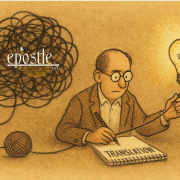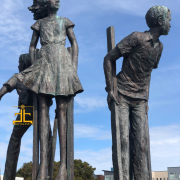Translators
Armodoxy for Today: Translator
Translating is the first step in understanding. The fact that there is so much misunderstanding in our world today points to an inability (or unwillingness) to translate. The Armenian Church celebrates the “Holy Translators” (Srbots Tarkmanchats), this coming weekend. The men in this group were not contemporaries of one another, that is, they lived in different time periods, separated over a span of 700 years or so, yet they are known as a group, The Holy Translators. Yesterday we looked at the group and found the common thread among them was their ability to communicate by simplifying that which was complicated and complex.
Jesus was the ultimate translator. He came to a world that was wrapped up in laws and regulations which kept people alienated from the essence of Faith, namely from God. He simplified it. With parables about wheat, seeds, soil, and talents, he simplified the most complex ideas of purpose and God-centeredness. He simplified the complicated laws. There are 617 laws in the Old Testament. Moses brought it down to 10 commandments. Jesus, simplified it even further, down to one word: Love. “You shall love the Lord your God with all your heart, with all your soul, and with all your mind,” He answered when questioned which is the greatest commandment. “And the second is like it: You shall love your neighbor as yourself. On these two commandments hang all the Law and the Prophets.” (Matthew 22:37-38)
Consider how simple this is. If you love God and love your neighbor, you can’t murder, you can’t lie, you can’t steal, you are filled with honor for others. Accordingly, it follows then, that the simplification of the law and the prophets was found in the person of Jesus Christ. He is the fulfilment of the law and prophets. He said so distinctly, “I am the way, the truth and the life.” (John 14:6)
The Holy Translators directed people to Christ. It was St. Nersess Shnorhali, the 12th century member of this group, who equated Christ with Love. “The name of Love is Jesus” he wrote in the Aravod Luso hymn. In pointing to Christ, the Holy Translators were pointing to love as the golden key of understanding. That is, through love, the most complex and complicated realities are translated and simplified.
The translators are persons in history, but we have translators in our midst today. Think of a mother, who stands between her husband, children, sometimes parents, sometimes extended family, and somehow translates the differing ideas and tones to bring about harmony. Think of the teacher who spends extra time with a student to assure him or her that there are options after a failed test. Or think of the priest who brings comfort to a family who cannot understand how they will survive the tragic loss of a loved one. These are all people who have accepted the invitation to translate, that is, to understand others. And the invitation is now given to us – you and me. Accept the invitation. Translate the complexity of bitterness, hatred, separatism, and everything else that prevents us from understanding one another, translate them to the simplicity of the message of Christ: love.
Let us pray, “Lord Christ our God, through the intercession of your Holy Translators, Saints Mesrob, Yeghishe, Movses the poet, David the invincible philosopher, Gregory of Narek and Nersess of Kla, I ask that you open my heart to understanding so that I may be in harmony with my surroundings and those with whom I come into contact. May I find joy in the simplicity of your Love commandment and keep that ever before me as I go through this life. In all things I glorify you with the Father and Holy Spirit. Amen.

 2012 Fr. Vazken
2012 Fr. Vazken 2914 Fr. Vazken
2914 Fr. Vazken 2025 Epostle
2025 Epostle



 2023 Fr. Vazken
2023 Fr. Vazken
Leave a Reply
Want to join the discussion?Feel free to contribute!